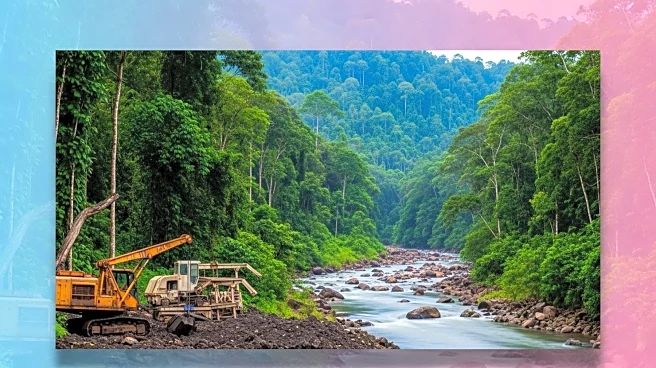What's Happening?
The Nicaraguan government, led by Daniel Ortega and Rosario Murillo, has allocated over 500,000 hectares of land for mining activities to eight Chinese companies. This decision, covering the period from October 2023 to October 2025, involves significant areas within the Río San Juan Biosphere Reserve, including the Indio Maíz Biological Reserve and the Los Guatuzos Wildlife Refuge. The concessions allow these companies exclusive rights for mineral extraction, exploration, and the establishment of processing plants. The environmental group Fundación del Río has criticized these actions, highlighting the lack of transparency and consultation, especially in protected areas. The concessions are seen as part of a broader strategy to open Nicaragua's natural resources to foreign interests.
Why It's Important?
The allocation of such vast tracts of land for mining raises significant environmental and social concerns. The affected areas are crucial for biodiversity and indigenous communities, and the concessions could lead to deforestation, pollution, and encroachment. The decision also highlights the geopolitical influence of China in Latin America, as it secures access to valuable natural resources. Economically, while mining exports have increased, the long-term environmental costs and potential social unrest could outweigh immediate financial gains. The situation underscores the tension between economic development and environmental conservation, with potential cross-border impacts on neighboring Costa Rica.
What's Next?
The future may see increased scrutiny and opposition from environmental groups and local communities. There could be calls for more stringent environmental assessments and greater transparency in the concession process. International attention might also focus on the environmental and human rights implications of these mining activities. The Nicaraguan government may face pressure to balance economic interests with sustainable development and conservation efforts.
Beyond the Headlines
The concessions could set a precedent for how natural resources are managed in Nicaragua and similar regions, potentially influencing policies on foreign investment and environmental protection. The involvement of Chinese companies reflects broader global trends of resource acquisition and economic influence, raising questions about sovereignty and local governance. The situation also highlights the challenges faced by environmental organizations operating under restrictive regimes.








